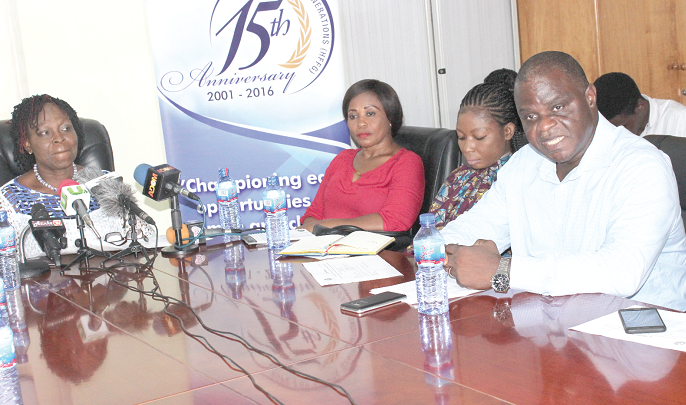
Ghana Refugee Board adopts new approach
Ghana is shifting focus from the purely humanitarian approach to refugee management to a development approach due to dwindling international humanitarian resources, the Ghana Refugee Board has said.
Advertisement
The board attributed the dwindling humanitarian resources from the international community to the rising numbers of refugee worldwide.
At a press briefing as part of activities to mark World Refugee Day in Accra last Tuesday, the Eligibility Officer of the Board, Ms Doris Tagoe, said the total number of refugees had increased to more than 25.5 million globally with 11, 865 in Ghana.
“Additionally, 1,371 of the global number were displaced and seeking asylum in Ghana,” she said.
The press conference was also used to raise awareness on domestic violence as the day coincided with the global commemoration of the International Day for the Elimination of Sexual Violence in Conflict.
The day
Instituted by the United Nations (UN) and marked every June 20, the day is to honour the resilience and courage of the more than 65 million people who have been forced to flee war, persecution and violence.
It is also a day to recognise those communities and people around the world who receive refugees and the internally displaced in their midst, offering them a safe place, and welcoming them in their schools, their workplaces and their societies.
Ms Tagoe explained that the development approach to refugee management would focus on harnessing the skills of refugees for productive ventures for their own benefit and the benefit of the economy.
The press briefing was organised in partnership with Hope for Future Generations (HFFG) in Accra.
Ghana lives up to expectations
Ms Tagoe said Ghana had lived up to its responsibilities as indicated in the United Nations and African Union conventions on refugees.
“The government ensures that refugees are guaranteed all fundamental human rights and freedoms available to Ghanaians, including access to livelihoods, social and other services without discrimination,” she said.
She explained that the Ghana Refugee Board and other partners had been collaborating with the government to mainstream social services for refugees into the national system.
Ms Tagoe said, to that effect, all educational and health facilities in the refugee camps in Ghana had been integrated into the Ghana Education Service (GES) and the Ghana Health Service respectively to ensure equity in the provision of healthcare and educational services.
On exploitation and sexual violence, Ms Tagoe said refugees continued to face challenges in their countries of asylum.
“The vulnerable ones are prone to all forms of exploitation and sexual violence in their search of daily survival and livelihood. In such situations, sexual exploitation, rape, prostitution, child-molestations, domestic violence and human trafficking cannot be ruled out,” she said.
HFFG remarks
For her part, the Executive Director of HFFG, Mrs Cecilia Senoo, expressed worry over ways sexual violence against women and children were dealt with in the country.
According to her, cost of acquiring medical report to support the demand for justice and other financial burdens in the justice seeking process were hindering most victims from obtaining justice because they are normally poor people.
Mrs Senoo indicated that reported cases from the Domestic Violence and Victims Support Unit (DOVSSU) of the Ghana Police Service were on the increase and added that women, girls and children were the most affected.
She called on the government to put in place measures to ensure that victims received support and justice irrespective of their financial status.
Mrs Senoo said her organisation’s aim was to champion equal opportunities for the vulnerable in society who were disadvantaged in terms of access to various goods and services.
Background
In Ghana, 6,651 people, approximately 50.2 per cent of all refugees, live in three refugee camps located in the Central, Western and Brong Ahafo regions.
The rest live mainly in Accra, Tema and Takoradi.
There are about 2,700 Togolese refugees settled in the Volta Region, predominantly in the border towns of Aflao and Ho.



